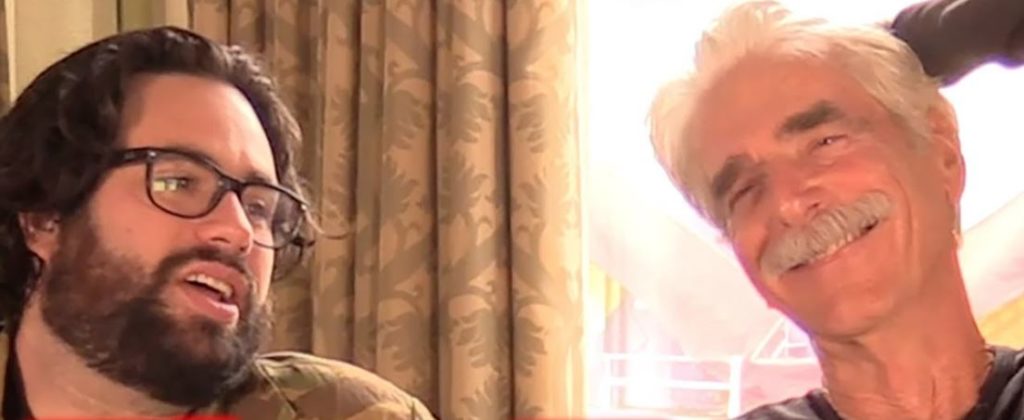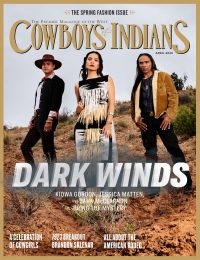
The director was eager to work again with his “I’ll See You in My Dreams” star.
John Wayne and John Ford. James Stewart and Anthony Mann. Randolph Scott and Budd Boetticher. And now … Sam Elliott and Brett Haley?
Well, maybe. Already, the beloved veteran actor and the rising young filmmaker have impressed critics and engaged audiences with two collaborations: I’ll See You in My Dreams, the 2015 indie sleeper hit starring Blythe Danner as a widowed former songstress who takes a chance on romance with a handsome suitor (Elliott); and The Hero, a hand-tooled star vehicle for Elliott, about a career-stalled western actor who’s warily taking stock of his life.
Now on view in limited theatrical release, The Hero — which Boston Globe film critic Ty Burr has aptly described as “a love letter to an actor that reminds us of why we ought to love him, too” — has Elliott perfectly cast as Lee Hayden, a former western movie icon who, while waiting in vain for new roles, divides his time between doing voiceover gigs, hanging out with his best buddy (Nick Offerman), and smoking copious amounts of weed.
After receiving some life-changing news, however, Lee is driven to re-examine his past — and, while he’s at it, to rekindle hopes of repeating his signature role in a sequel to The Hero, the most popular of all his westerns. He also wants to reconnect with his ex-wife (Katharine Ross, Elliott’s real-life spouse) and estranged daughter (Krysten Ritter of TV’s Jessica Jones), but he can’t quite figure out how to do it. Further complications arise when he meets and befriends a brassy stand-up comic (Laura Prepon of Orange is the New Black), whom he impulsively invites to join him when he’s honored by an organization of western fans.
We caught up with Brett Haley when he presented The Hero at the Dallas International Film Festival. Here are some highlights from our conversation.
Cowboys & Indians: Obviously, you wrote “The Hero” with Sam Elliott in mind.
Brett Haley: Yeah. I mean, if Sam would’ve said no, we wouldn’t have made the movie, period.
C&I: And you obviously drew on incidents and elements from his life. Of course, Lee Hayden is a less successful actor ...
Haley: [Laughs.] Much less successful.
C&I: And you indicate that Hayden appeared in only one significant movie. Granted, it was so successful, and remains so enduringly popular, that he still gets invited to gatherings of western fans. But these days, his major source of income is voiceover work for commercials.
Haley: Well, you know, I think you can’t make a movie about Sam playing an actor who’s a western guy and not talk about his voice, and not imagine him as a western icon of some kind. But imagine if Clint Eastwood only made The Man with No Name trilogy, and then never did anything else. His career sort of fell off. That’s kind of what Lee Hayden did. He made this great classic western, then we never kind of heard from him again in any significant way. He’s been working, but as you say, getting by doing the commercial voiceovers. Nothing of substance.
That’s not Sam Elliott. Yes, he does voiceover work. But Sam Elliott is a guy who’s been working consistently for over 40 years in the industry. While many things cut close to the bone between Lee and Sam, Lee could not be more different from who Sam is in real life. Sam is happily married, he has a great relationship with his daughter. [Laughs.] And he wants everybody to know he does not smoke pot. He’s very convincing in the movie. But while I was trying to direct him during [scenes in which Lee gets high], he was like, “What the bleep, man? I don’t know what this is and how I’m supposed to be.” And I just said, “You know, look — it's like this.” And I gave him the direction, and he just did it.
So, there are so many things that are totally fictionalized. We wanted to make this guy very different from who Sam is, but also play on his western background. Like the fact that he’s been typecast as a cowboy pretty much his whole career … . We wanted to play on the things that people know and love about Sam, but we also wanted to create a completely fictional character, which is what Lee is.
C&I: Longtime Sam Elliott fans may be amused by the ways that you occasionally blur the line between fact and fiction. At one point, for example, Lee auditions for the role of a cowboy-type character in the movie version of a young adult fantasy novel.
Haley: That’s right. That’s a little nod to The Golden Compass, which Sam appeared in. [Laughs.] Lee isn’t quite so lucky.
C&I: Were there any things that Elliott felt uncomfortable about doing? Like, did he ever say, “Look, I’d really rather not go there,” and ask for changes in the script?
Haley: No, he was game. He was a little freaked out at first, I think, about just doing it in general, because it was so close to him in many ways. But no, he was game. He never was like, “I don't want do this, I don’t want do that.” And, I mean, I make him do some pretty wild stuff in this movie. Like the whole relationship with Laura — that had to be dealt with just right. You know, it was tough, but Sam was never uneasy. He put his trust in me, and I’m so glad that he did. And we just, you know, came together and did this thing.
C&I: It’s probably a good thing you had him keep his mustache. We’ve gotten feedback at the magazine whenever he does a role without a mustache. And, seriously: It’s almost as though his fans get offended if he’s on screen without it.
Haley: Yeah, they freak out.
C&I: Like when he played that continuing role on the final season of “Justified.”
Haley: But that was good for him, because he was a villain in that, and he looks a little more villainous without his mustache. You’re like, “Who are you, man?” Like he doesn't look recognizable.
You know, I love that scene [in The Hero] with him and the girl and she’s like, “I just love your mustache.” Because I’ve seen people go up to him and say that bleep. I’m like, “Are you really saying that to him?” [Laughs] But, yeah, people love it. Me? I think it's the greatest mustache in movies. I mean, Tom Selleck is good, but he ain’t no Sam Elliott. Sam Elliott is number one with a bullet. I think it’s amazing — and it is sort of a work of art, that mustache. It really is.
C&I: OK, to ask the obvious question: You’re a relatively young guy, but in your last two movies — “I’ll See You in My Dreams” and now “The Hero” — you’ve focused on characters who are, well, more mature than we’re used to seeing in most movies these days. But they’re not movies that go for cheap laughs about how “cute” old folks are. Are you drawn this kind of subject matter?
Haley: Well, I'm not drawn to a specific demographic, just to put that out there. I'll See You in My Dreams happened to be about a 70-year-old woman dealing with grief. I wanted to tell a story about grief, and I felt that the best way to do it, the best vehicle for that story, would be an older person, specifically a 70-year-old widow. To me, that was a more interesting story than some story about grief, and the themes that I wanted to explore, with someone like me. I was a 30-year-old guy at the time, and it just didn’t add up to me. It didn’t have any weight. It didn’t have any substance. So that just came from my gut. I wasn’t like, “Oh, I'm gonna make something about that demographic.” I didn't think about that at all. That was a tiny movie that found an audience. And I’m very grateful that it did.
And [The Hero] came about because I love Sam Elliott. I wrote it for him. He happens to be a man of a certain age. And I hate the way that Hollywood treats people of a certain age — these terrible jokes about age, clichés, and, like you said, the cuteness of it all. They just happen to be of an age. I try to film my characters as real people, not as an old person — quote, unquote — or whatever. As just a person who's trying and doing their best.
I like the weight and the experience that comes with an older character. And that is what this movie’s about. It’s about legacy. It’s about looking back on your life and saying, “What was this all for — and did I do a good job?” I think most of us, when we get towards the end, we’ll have that moment. I mean, I have that moment now at 33. I just look back, and I think: “How did I get here? Am I doing good? Are my relationships good?” And that's what this film is about. It's about the relationships in your life, and how important those are. You can do something of worth — quote, unquote — or not. But at the end of the day, if you don’t love the people that love you as best you can, what was the point of it all? That’s my theory about walking through this world: It’s all about the relationships.
So to me, this isn’t a film about an old person. It’s just about a person who happens to be a certain age.












